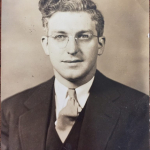But Then, She’ll…

Perhaps because Halloween ghosts and goblins were everywhere and trick or treat just a few days away–who knows?–but mortality leaped into the conversation in my kitchen on a recent weekend morning. Of all things, it grew out of a session making pumpkin bread, a fall breakfast favorite with Buddy and Sis.
G-ma makes no apologies here to serious bakers for cheating with a pumpkin bread box mix from Trader Joe’s, a handy option that’s extra appealing when small, aspiring cooks want in on the action. Buddy, who at seven easily reads cooking instructions on the side of the box, latched on immediately to the concept of the fractions listed, along with their corresponding markers on the measuring cups. With the careful, studious intent that is his general modus operandi, he measured and poured the oil and water into the bowl, enjoying the little flour cloud that rose with a satisfying puff when he dumped the dry mix into the bowl of the liquids. Sis, an earnest competitor when armed with a big wooden spoon, plunged onto the scene in time to seize a first turn at the blending and stirring of the batter. As soon as I wasn’t looking, the sound of lip-smacking told its own tale, as she shared congenially with her brother the occasional nips of batter from the spoon’s edge.
Stirring, sniffing, and sampling escalated anticipation about the ultimate product at a rapid rate, because pretty soon Buddy declared, “I think we should have pumpkin bread at Evie’s house every time FOREVER.”

These two love to work in the kitchen.
My back still turned as I wrangled a tray of bacon at the hot stove, I heard Sis reply with marked nonchalance, “Yeah, we can do that for a while, but then she’ll die.”
The bacon tray clattered loudly on the stovetop, mercifully containing its sizzling grease when I released it involuntarily and whirled around to face the children at their workstation at the end of the counter. What did you say? I asked her, stunned and wondering if I had heard it correctly. I must have raised my voice in sheer surprise, because she instantly burst into tears, droplets gushing down her flushed cheeks at a rate that would soon have salted the waiting batter below. “I want my mommy!” she wailed.
I instantly encircled her in both arms as she stood frozen on the stool she requires to reach the countertop. No, no, don’t cry, I begged, fervently wishing I could whack the top of my head with some hard object and jolt myself into greater sensitivity. It’s OK, I didn’t mean what you said was wrong! You’re right, someday I will die. Everyone does. It’s OK for you to say that, because it’s true. Please don’t cry, I repeated, immediately fearing that what I’d just said could make it worse. At five, would she understand what any of it meant?
When the sobbing de-escalated to deeply offended sniffles, I released her and stepped back to wipe her face as her brother put his arm around her shoulders in comradely support. Striving for a relaxed, easy tone, I still couldn’t stifle my curiosity. It’s OK that you said that, Sis, really, I resumed. But what made you think it? Nervously, I pawed at my cheek, wondering if I looked unusually pale, or had dark circles under my eyes, or was notably overdue at hiding the gray roots above. Had I conveyed some hint I might be sick? Had someone she knew died recently, and I hadn’t been prepared to acknowledge it? I remembered when they had to be told their beloved dog had died, but was there something else?
This jarring little exchange sent me scampering for expert resources a few hours later, after the children had gone home. Interestingly, a few simple keywords and clicks yield lots of literature with recommendations for talking to children about death when it occurs, with helpful specifics about tailoring the approach to the appropriate developmental stage. But I found little to explain what a five-year-old actually comprehends when she suddenly predicts the profound but abstract concept of death for one of the more—ahem—senior people in her life. A 2013 piece in Psychology Today*, for example, had this to say:
“Children, between 5 and 9 years old, who do acknowledge the permanence and inevitability of death see it as something that only applies to older adults. Some children who have an incomplete understanding of death often will fill in gaps in understanding with fantasy elements (often taken from the media). Furthermore, because they do not think abstractly, some young children do not understand the causality of death.”
Hmmmm. After hearing Sis so calmly forecasting my inevitable demise after countless iterations of pumpkin bread, I’m not sure I buy the part that kids her age “don’t think abstractly.” Nevertheless, I can only hope life spares her and her brother the need to explore this further for several years to come.
Meanwhile, back at the kitchen counter, Sis took a few deep cleansing breaths and resumed her stirring, seemingly unable to answer my question. I sought a lighter, diversionary tactic.
Do you really think I’m that old? I asked with a wink, a smile, and clearly teasing tone. Unsure if this was a trap, she kept her eyes on the fragrant, speckled pumpkin batter, sniffed once more, and asked, tentatively, “Well, how old are you?”
In a couple of weeks, I’ll be 62, I answered with more cheer than my soul may have actually contained, hearing that number out loud and still watching her face.
She widened her eyes but remained uncertain how to respond, so her brother stepped helpfully into the gap. Perhaps his turn with the batter spoon inspired some deep-seated optimism.
“Oh,” he nodded, adding knowledgeably, “then I think you could live another couple of years.”
Well, thank goodness. And with that, it seemed best to change the subject and move on to stuff the warm, waiting oven with its pumpkin-flavored prize.

Ready for trick or treat!
——————————————————————————————————————————
*” How Do Children Comprehend the Concept of Death?” by James A. Graham, Ph.D., Psychology Today, 2013.


